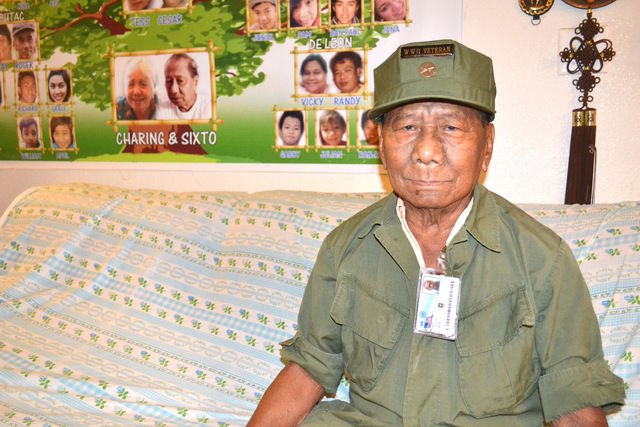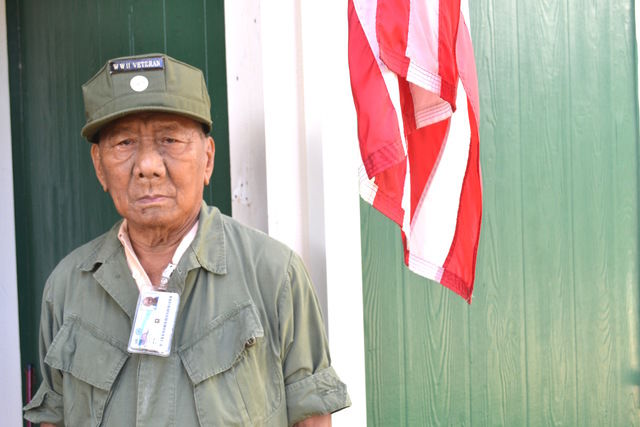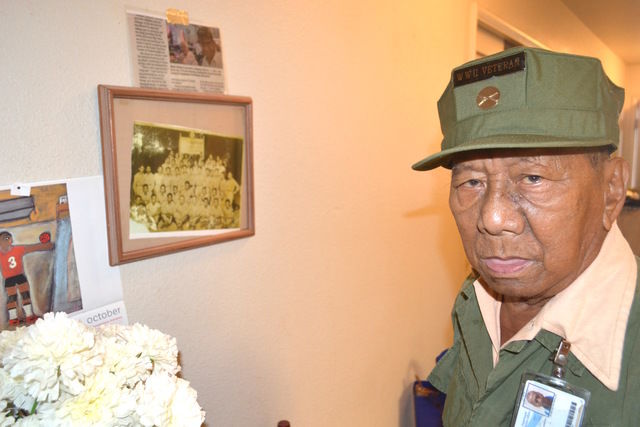HANAMAULU — At 91 years old, Sixto Tabay sits quietly on a white plastic chair between two railings in his home at Kalepa Village Thursday. The sun on his face, the World War II veteran salutes passersby and neighbors. He
HANAMAULU — At 91 years old, Sixto Tabay sits quietly on a white plastic chair between two railings in his home at Kalepa Village Thursday.
The sun on his face, the World War II veteran salutes passersby and neighbors. He wears a dark green Army cap and sports a jacket and shorts of the same color.
Tabay is the last surviving Filipino veteran on Kauai — out of 13 — who served on the 12th Infantry Division, a group of 10,473 Filipinos enlisted from the Philippines to fight for the United States.
He is among the 18,000 Filipino World War II veterans alive today who may be honored with the country’s highest civilian award.
“I’m very thankful for my services in the United States Army,” said Tabay, who served from 1946 to 1949 as a small arms repairman. “They did not like me go to war. They like me stay in the shop to repair all guns from .22 to .50 caliber.”
The Filipino Veterans of World War II Congressional Gold Medal Act (S.1555) — sponsored by Sen. Mazie K. Hirono and Rep. Tulsi Gabbard and unanimously passed by the U.S. Senate in July — will now head to the president’s desk for final approval.
If approved by the president, the veterans will receive the Congressional Gold Medal.
“For months, we have said that time is running out to recognize Filipino World War II veterans for their brave service,” Hirono said. “(The) House passage is the culmination of decades of work by these veterans and their families to recognize their key role in the Allied victory, and their decades-long fight for benefits.”
Ed Kawamura, commandant for the Kauai Veterans Council, said the distinction is honorable.
“Like the World War II Nisei, it took them so long to get there,” he said. “For those that are here, getting a medal will mean a tremendous honor. They were never thought of as a veteran, then it took quite a time to become a veteran, and now they’re getting recognized.”
Gabbard said the U.S. Congress took a historic step forward in honoring the more than 200,000 Filipino and Filipino-American soldiers that served the country during World War II.
“Our Filipino World War II veterans have waited decades for this recognition alongside units like the Tuskegee Airmen and Hawaii’s own 442nd/100th Infantry Battalion,” she said. ” I urge the president to sign this bill into law before the year’s end, and honor our veterans with this long-overdue recognition.”
Maj. Gen. Antonio Taguba (Ret), chairman of the Filipino Veterans Recognition and Education Project (FilVetREP), said the honor would be a significant seminal period in American history — second only to the liberation of the Philippines and surrender of the Japanese Imperial Forces on Aug. 15, 1945.
“Now we can tell our veterans with pride in our hearts that this grateful nation has, at last, granted them recognition for the selfless sacrifice they endured in war, and restored their dignity and honor in service to their nation,” Taguba said.
The 91-year-old Hanamaulu resident may be a little hard of hearing, but he always pops up to attention whenever he talks about his service to his country.
“I’m very thankful to be an American citizen,” he said. “Now, I can take my family from the Philipines. Barack Obama told me all my kids can come here freely.”




